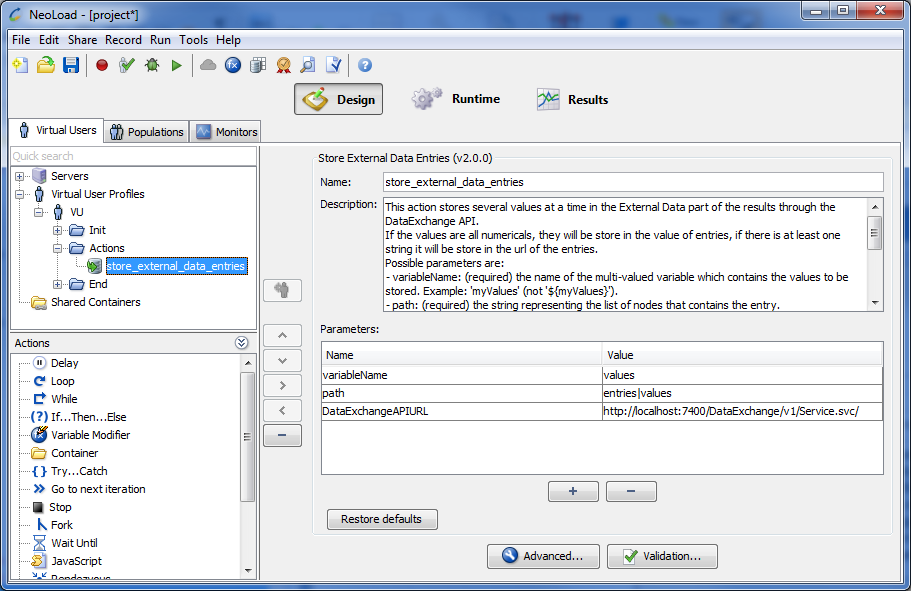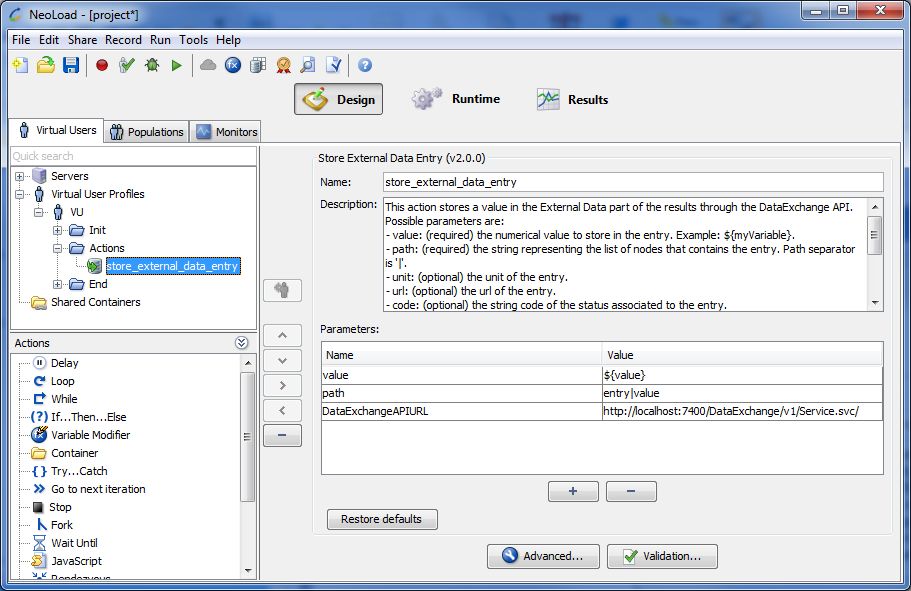Misc.
Custom Measurement
The Custom Measurement Advanced action enables you to record customized data to perform an analysis of an action.
Typically used to track the values of a NeoLoad variable over time, the variable value being generally extracted from an HTTP or SQL response, or computed by Javascript. This is very interesting to monitor a business metric of an application like the number of orders being processed in the previous minute for example.

Parameters:
- duration: The duration (in ms) of the action.
- isError (optional): sets the Advanced action response in error. (Default value: false)
- responseCode (optional): Sets the response code.
- response (optional): Sets the response content.
Store External Data Entries
The Store External Data Entries Advanced action stores several values at a time using the Data Exchange API. Theses values are referred to as “External Data” in the Runtime and Results tabs. A typical use is to grab business-related metrics through a Variable Extractor or through the SQL action and store them for later analysis. The entry values can be structured in a tree by specifying different paths in the path parameter.
If at least one of the variable values is not numerical, all values will be displayed in the URL column of the External Data.

Parameters
- variableName: The name of the multi-valued variable which contains the values to be stored. Example: “myValues” (not “${myValues}”).
- path: The string representing the list of nodes that contains the entry.
- unit (optional): The unit of the entry.
- code (optional): The string code of the status associated to the entry.
- message (optional): The message of the status associated to the entry.
- state (optional): The state of the status associated to the entry. Possible values are PASS and FAIL.
- DataExchangeAPIURL: The url of the DataExchange server. Typically the NeoLoad Controller.
- DataExchangeAPIKey: The identification key specified in NeoLoad.
Examples:
An example of values stored from a multi-valued variable:
- variableName: ids
- path: index|ids
- DataExchangeAPIURL: http://localhost:7400/DataExchange/v1/Service.svc/
A full example of values stored from a multi-valued variable:
- variableName: categories
- path: index|categories
- code: ERROR_INVALID_HANDLE
- message: The handle is invalid.
- state: FAIL
- DataExchangeAPIURL: http://localhost:7400/DataExchange/v1/Service.svc/
- DataExchangeAPIKey: myKey
Store External Data Entry
The Store External Data Entry Advanced action stores a numerical value using the Data Exchange API. This value is referred to as “External Data” in the Runtime and Results tabs. A typical use is to grab business-related metrics through a Variable Extractor or through the SQL action and store them for later analysis. The entry values can be structured in a tree by specifying different paths in the path parameter.

Parameters
- value: The numerical value to store in the entry. Example: “${myVariable}”.
- path: The string representing the list of nodes that contains the entry. Path separator is ‘|’.
- unit (optional): The unit of the entry.
- url (optional): The url of the entry.
- code (optional): The string code of the status associated to the entry.
- message (optional): The message of the status associated to the entry.
- state (optional): The state of the status associated to the entry. Possible values are PASS and FAIL.
- DataExchangeAPIURL: The url of the DataExchange server. Typically the NeoLoad Controller.
- DataExchangeAPIKey: The identification key specified in NeoLoad.
Examples:
An example of values stored from a variable:
- value: ${time}
- path: time
- unit: ms
- DataExchangeAPIURL: http://localhost:7400/DataExchange/v1/Service.svc/
A full example of values stored from a variable:
- value: ${executionTime}
- path: variables|int|executionTime
- unit: ms
- url: http://www.myapp/script1
- code: ERROR_INVALID_HANDLE
- message: The handle is invalid.
- state: FAIL
- DataExchangeAPIURL: http://localhost:7400/DataExchange/v1/Service.svc/
- DataExchangeAPIKey: myKey